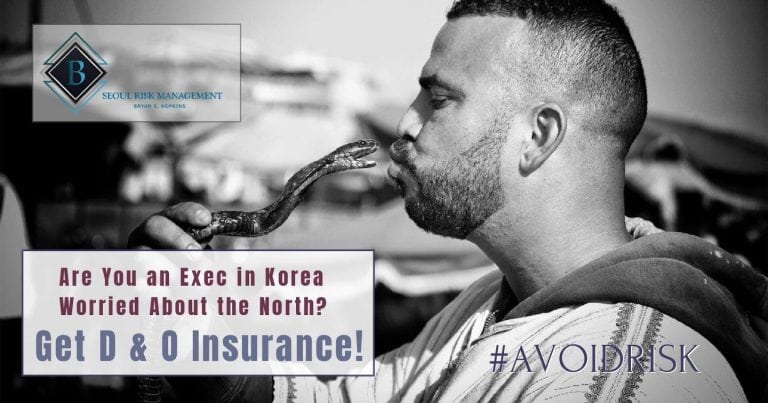
Korea is unique in the world with regards to the extent to which directors on a company board and chief executive officers can be held personally liable for a wide range of corporate liabilities. Considering this situation, if you don’t already have Directors & Officers (D & O) Insurance, then you need to spend some time considering how you could be liable in the event of a catastrophe - man-made or otherwise - and may want to access the risk with a professional.
Obviously, to protect the BOD as well as officers from frivolous lawsuits, including shareholder actions, a company should purchase directors and officers insurance (D&O insurance). Whether to use D&O insurance is a question that must be decided in the context of legal risk management.
Good corporate governance requires the board to be fully informed as to the major risk issues facing the company. D&O insurance may be necessary to protect the BOD as well as executive management from lawsuits stemming from fiduciary responsibilities or lack thereof.
For American companies operating in Korea this is particularly relevant. Corporate governance scandals brought about Sarbanes-Oxley Act (SOX) in the United States in 2002. SOX requires, among other things, that proper internal financial controls be established in publicly traded companies as well as whistleblower provisions and compliance policies.
In fact the U.S. laws and regulations regarding compliance requires that the board of directors (BOD) are not only trained in compliance but also has compliance oversight.
Similar measures have been passed in other jurisdictions as well. The result of SOX and other laws in other jurisdictions was to force upon the BOD the obligation of ensuring that not only proper financial controls are in place and properly maintained but that the Board be apprised of all relevant risk management process as well.
Hence, risk management processes in general must be considered by the board of directors in light of the board’s fiduciary and legal responsibilities. As director’s have a duty of care to the company, they have a duty to protect corporate assets and IP, review risk management plans, including crisis management plans and take all actions that a prudent businessman or businesswoman would take to protect the company.
The fiduciary obligation directors’ have to their respective corporations includes the duty to be fully informed and knowledgeable on major issues of risk. Whether it is compliance issues, currency risk, antitrust, or, geopolitical risk, etc., the BOD must be fully informed to make the appropriate decisions involving the management of the company.
Due to its very nature, the BOD cannot escape its fiduciary obligations with regard to understanding and approving risk management processes.
Considering the potential litigation directors might face in light of geopolitical events, such as the current situation concerning North Korea, it is prudent to consider D&O insurance. What is the status of D&O insurance in your company? Have you examined the legal risks facing your directors and CEO recently?
What happens if things fall apart or the situation dramatically deteriorates? If you haven’t addressed the situation, the wise thing to do would be to sit down with your insurance broker, if you have one, and discuss the pros and cons of such insurance policies.